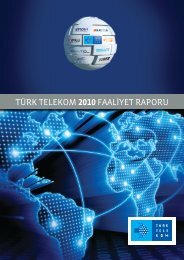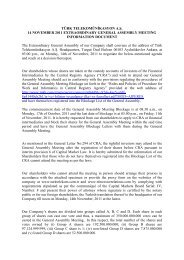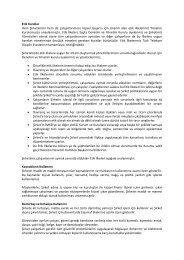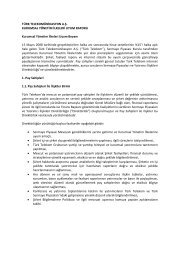PDF (3,0MB) - Türk Telekom Investor Relations
PDF (3,0MB) - Türk Telekom Investor Relations
PDF (3,0MB) - Türk Telekom Investor Relations
You also want an ePaper? Increase the reach of your titles
YUMPU automatically turns print PDFs into web optimized ePapers that Google loves.
Activities 2012mobile Internet usage was 10.458 Tbyte in Q4 2011, itincreased to 21.590 Tbyte in Q4 2012, and the number ofsmart phone users reached nearly 13 million by yearend2012. Avea, at 24%, has the highest smart phonepenetration rate in the market.Another factor influencing market growth is the ongoingprepaid-to-postpaid tariff migration. By the end of 2012,62% of mobile subscribers were prepaid subscribers, andin the last year the rate of postpaid subscribers increasedto 38.4% from 35.3%. Turkey’s prepaid subscriber ratioof 62%, as compared with Europe’s 43%, indicatesgrowth potential in the country that will occur withcontinued migration to postpaid tariffs.In 2012, while the number of mobile subscribers and themobile penetration rate both increased, Turkey was still seento be the top country in Europe in terms of mobile MoU.InvestmentsIn 2012, the significant amount of fixed line investmentswas for fiber transformation. In addition, cloud services,IT, VPN, IPTV and digital media were among themore remarkable investments. Sizable investmentsin the mobile segment were comprised of 2G and 3Ginfrastructure and base station investments.By the end of 2012, total mobile traffic was approximately170 billion minutes while fixed traffic was amounted to19.4 billion. While mobile traffic increased by more thanapproximately 15%, fixed traffic decreased by more than11% compared with the previous year. Total traffic, whichwas approximately 170 billion minutes at year-end 2011,reached approximately 190 billion minutes by year-end 2012.Fixed Voice MarketBy the end of 2012, the fixed voice penetration rate inTurkey, which has over 13.8 million fixed line subscribers,fell 2.3% to 18.3% compared with 2011. Regardless, sincethe number of average household is too large (3.76people) in Turkey this indicates that fixed line servicesusage is widespread in most of Turkey.In Turkey, Türk <strong>Telekom</strong> has nearly 90% market sharein fixed voice market service revenues. One of theimportant developments that occurred in fixed voicemarket in 2012 was the engagement of Wholesale LineRental. Along with this development, other fixed voiceservice providers also had the opportunity to providemore flexible offers to their customers with their owntariff structures by renting Türk <strong>Telekom</strong> lines. Thissituation also enabled TTNET to offer more enrichedpackages by adding fixed voice offers to ADSL packages.Fixed Broadband MarketTurkey offers investors strong opportunities in thefixed broadband market. Türk <strong>Telekom</strong> is in the leadingposition in fixed broadband market in Turkey with 88%market share. TTNET, a subsidiary of Türk <strong>Telekom</strong>, isthe leader of the retail fixed broadband sector with 76%market share. As of 2012, the fixed broadband populationpenetration rate in Turkey was 10.5%. This rate is fairlylow compared to the OECD average of 26%, indicatinggrowth opportunities in the countryBy the end of 2012, the number of broadband subscriberswas realized as 7.9 million with an annual growth rate of4%. The number of fiber subscribers was nearly 645,000.Most of this growth stems from the increase of %140 inthe number of fiber subscribers compared to last year.Türk <strong>Telekom</strong> leads Turkey’s fiber transformation.Significant progress has been made in line with the targetto establish a fiber infrastructure within all 81 provincesof Turkey. By the end of 2012, Türk <strong>Telekom</strong>’s fiberinfrastructure amounted to more than 168,000 km andhome passes (the number of households/buildings thatare able to receive fiber service) of over 1.9 million.High-speed Internet and fiber transformation enabledbroadband service providers to diversify their products.One of the most concrete examples for this is the IPTVthat enables broadcasting via Internet. IPTV is onlyoffered by TTNET in Turkey via the Tivibu Home brand.Multiple-product packages also take an important placein the Internet market. Internet service providers are ableto provide Internet and fixed-voice services as well as TVservices in a single bill along with DSL packages.80% of fixed broadband subscribers in Turkey preferpackages which allow for connections of up to 8Mbit/s.At the end of 2012, total fixed Internet usage was realizedat 579.036 Tbyte. TTNET is in the leading position inbroadband market at WiFi hotspot points. With TTNETWiFi, high-speed and safe Internet connection can beaccessed at nearly 6,000 points (airports, marinas, caféand restaurants, etc.) outside homes and offices.Another important development in recent years is thegrowth of the mobile broadband market. However,fixed broadband with its tariffs offering high speed andunlimited quota provides a competitive advantage overmobile broadband tariffs which can be provided with lowand limited speeds.Türk <strong>Telekom</strong> regards 3G technology as complementaryto broadband, not as a substitute. The Common Quotatariff, a first in Turkey which TTNET launched at the endof 2012, is a result of this approach. With the CommonQuota, the subscribers enabled to use their internetquota in the package of fixed broadband tariffs, also withtheir 3G mobile devices.Mobile CommunicationAs of December 2012, there were 67.69 million mobilesubscribers in Turkey, nearly 89.5% of the population.While Turkey was top among European countries in termsof mobile MoU with 291 minutes, Avea became the topoperator in terms of MoU in Turkey with 350 minutes.In addition to the number of 3G subscribers growing in 2012(from 31.4 million at the end of 2011 to 41.8 million by theend of 2012), the number of subscribers who connected toInternet via mobile devices and smart phones along with3G services also increased (from 6.4 million to 12.16 millionin the same period). By the end of 2012, the total mobileInternet usage amount realized as 69.073 TByte.Another important development in 2012 was themigrating tendency from prepaid subscribers to postpaidsubscribers. With more than 44% postpaid subscribers,Avea is in the leading position. In 2012, there was anincrease in mobile data revenues. Increased 3G-enableddevices and smart phones, as well as increased mobiledevice penetration rates, had a huge impact on this. Atthe end of 2012, there were approximately 13 millionsmart phone users in Turkey, and the operator withthe highest smart phone penetration was Avea. Thecampaigns of mobile operators related to smart phoneswas effective on the rapid increase of the number ofsmart phones.* Data of Turkey’s telecommunications sector wasexamined within the scope of the report issued basedon the data submitted regularly by operators to theInformation and Communication Technologies Authoritywhich carries out activities in Turkey’s electroniccommunications sector.Legislative Framework and Regulatory AuthorityThe sector’s regulatory authority the Information andCommunication Technologies Authority (ICTA), wasestablished in January 2000 under the name of TheTelecommunication Authority. As an authority withadministrative and financial autonomy, it becameoperational in August 2000 and, along with ElectronicCommunication Law, entered into force on November 10,2008 under its current name. As a specifically authorizedindependent administrative authority, ICTA has the authorityand duty to regulate and audit entry into the sector,activities, service standards, formation and maintenance ofcompetition, the protection of consumers and their personalinformation, operating principles of operators, settlement ofdisputes, and administrative sanctions.In 2012, the BTK took many important decisions aimed atdeveloping the sector. The most important of these wasthe “Wholesale Line Rental” regulation that entered intoforce on February 1, 2012. Through this service, alternativeoperators may collect monthly fixed line fees fromcustomers on behalf of Türk <strong>Telekom</strong> while the customer’sloop physically stays with Türk <strong>Telekom</strong>. All applicationsrelated to line transactions can be performed throughthe operator providing the service, and these operatorscan provide services through the tariffs which can bedetermined themselves and subject to the consent of ICTA.Türk <strong>Telekom</strong> obtains call origination and termination feesrelated to the traffic performed through the lines containedin Wholesale Line Rental (WLR) in addition to monthly fixedfees. Subsequent to this regulation, TTNET began providingfixed voice service in addition to fixed Internet and TVoffers, gaining an important position in the WLR market interms of number of subscribers in a very short time.The Regulation on Rights of Way in the Operation ofElectronic Communication Services was abolished as ofDecember 27, 2012 and new regulation on the usage ofevery kind of cable and similar materials on the currentfixed and mobile communications infrastructure was issued.54TÜRK TELEKOM ANNUAL REPORT 2012










